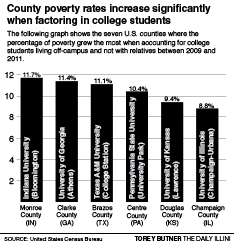Poverty simulation reveals struggles living paycheck to paycheck

November 12, 2014
A single mother with three kids has to send her children to school, but also get to work on time. She needs to buy more groceries, but she doesn’t know how to pay for the doctor’s appointment, let alone if she can keep her family’s home until the end of the month.
The poverty simulation hosted by the University YMCA and facilitated by United Way will take place today at 3 p.m. and challenges participants to experience the struggles of living on a low income. The simulation will run 90 minutes.
“Some students don’t know what they’re getting into,” said Muong Saeteurn, intern at the University YMCA and graduate student in Social Work. “They don’t really know what poverty means. They have this idea of what poverty is, but they don’t experience it.”
The simulation puts participants in “family” groups and each person has a role. They may be a veteran with a disability or a senior citizen, and they are asked to meet basic housing, medical, nutritional, energy and educational needs.
Families are supposed to strategize and do “whatever it takes” to survive.
Get The Daily Illini in your inbox!
Every 15 minutes represents one week in the simulation, and Saeteurn said students become frustrated as they realize their limits.
“You see them get frustrated,” she said. “They’re like, ‘If I do this, I can do this and this, but I’m limited in my budget and resources so I can’t do this.’ You reach the end and it dissolves into a sense of ‘OK, this is what people feel when they’re in this situation.’?”
The simulation also includes social service agencies that may be difficult to deal with in order to represent what could happen in real life when people try to reach out for help. The social service agencies monitor the groups’ different needs through ways such as food stamps.
There are typically between 75 to 100 participants, but they are hoping to reach 200 this time, Saeteurn said. This is the third poverty simulation hosted by the School of Social Work after the first event last spring.
“The hope is that students walk away from the simulation with a better understanding of the struggles that those in poverty can experience,” said Sheri Williamson, intern at the University YMCA and creator of the simulation. “Poverty moves from being statistics to an experience, even if only a simulated one.”
College students, drowning in student loan debt, are considered to live in poverty as they live paycheck to paycheck, said Williamson, a graduate student in Social Work. Poverty is often viewed as a single story, so the simulation helps break that stereotype.
“To a student, it may seem unlikely that he or she will experience poverty beyond college, especially if they feel their degree will propel them into financial stability,” she said. “With the economic shifts that have occurred in recent years, it is not implausible for a student to find him or herself struggling financially after graduation.”
Both the University and Parkland College have implemented food banks to help struggling students.
“Poverty can be a certain demographic, but it can also be the student living down the hall from you, living in class with you or walking the stage with you at graduation,” Williamson said.
Yoon Pak, associate professor in Education, is offering extra credit to her students if they attend the simulation.
“It’s increasingly important for all of us to understand the realities of life outside the bounds of our comfort and privilege,” Pak said.”
Pak said that there are schools in Champaign-Urbana where more than 90 percent of students live in poverty.
“If we as educators cannot relate to that at some level, we are doing a disservice to the future generation,” Pak said. “It is not just about individual motivation and hard work. There are too many working poor. I hope the poverty simulation provides a sliver of understanding of how reality operates for so many.”
Brittney can be reached at [email protected].






